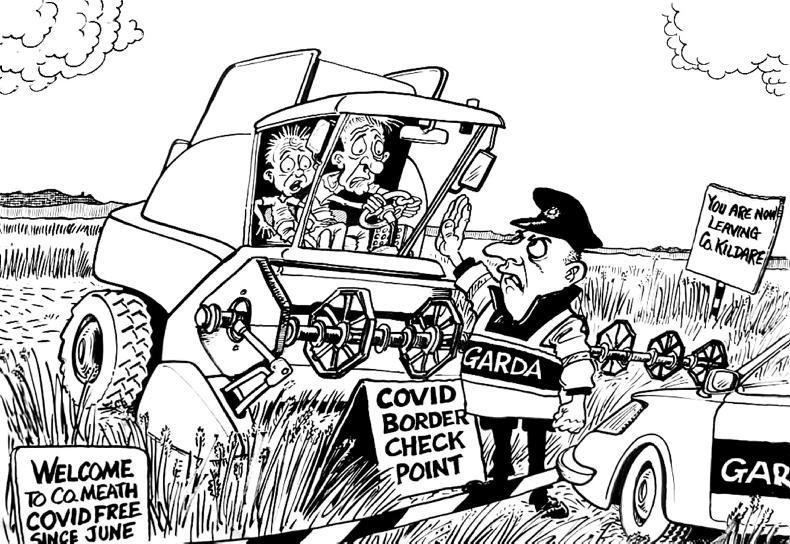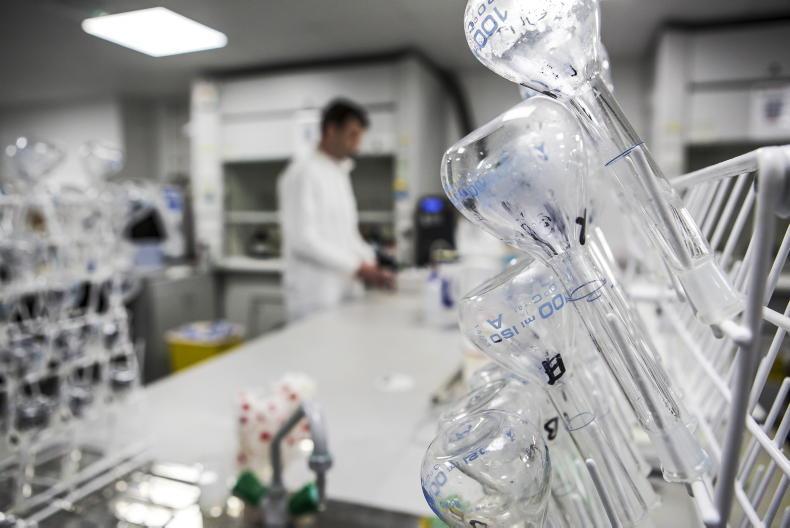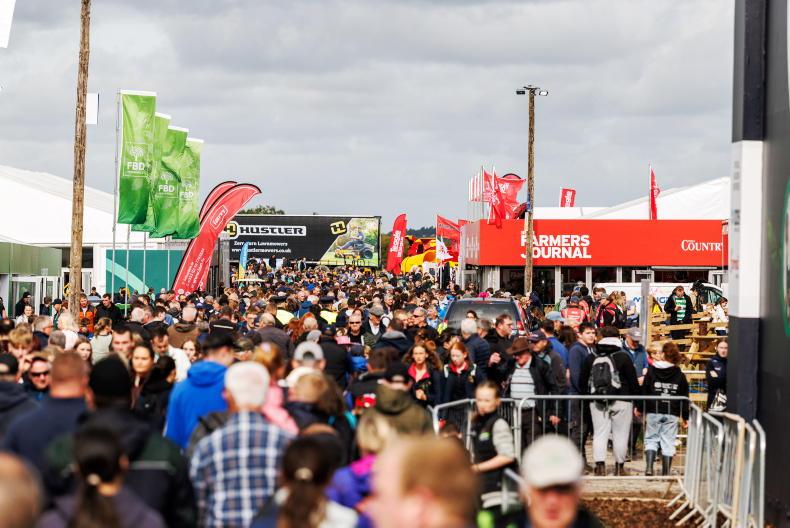In recent weeks the social solidarity that played a critical role in protecting our communities from the initial wave of COVID-19 has begun to fray. Six months into the fight against the disease and with no clear light at the end of the tunnel, public frustration is understandable. We have seen it vented against foreign tourists, towards the social activities of the younger generation and most recently at the food processing industry.
But in the battle against a disease we cannot allow any individual, section of society or indeed industry be vilified in the face of contracting the disease. Given the highly contagious and initially “silent” nature of the disease, there are inevitably going to be outbreaks – even where best practice has been followed by individuals or in a business. We only have to look to the fact that despite the level of training, hygiene standards and personal protective equipment, over a third of the total cases of COVID-19 in the country are in healthcare workers.
If we make example of rather than support parts of society or businesses where outbreaks are identified then we will simply force the virus underground, and in doing so create an extremely dangerous situation.
The absence of sick pay and the fact that, due to employment status, some workers may not be eligible for Government supports risks creating a cavalier culture among some towards the disease
By far the biggest weapon in stopping the spread of the disease is for those with symptoms to self-isolate for two weeks or until a negative test is confirmed. For this to happen we must ensure both the social environment and financial supports are appropriate to give individuals the confidence to do so.
Ensuring the proper financial supports are in place to encourage all workers to self-isolate is especially relevant in the case of the food processing sector. The absence of sick pay and the fact that, due to employment status, some workers may not be eligible for Government supports risks creating a cavalier culture among some towards the disease.
Factory operators have invested in the development of new protocols and safety equipment in line with HSE recommendations. But the effectiveness of these measures in preventing the spread of the virus among a young workforce where large numbers do not display any symptoms of the disease when infected or are reluctant to self-isolate is clearly not adequate – especially in a workplace environment that uses forced ventilation and is temperature controlled.
Ireland, of course, is not unique in this, with food processing facilities in the US, South America and throughout Europe all experiencing the same challenges in combating the spread of the disease. A recent investigation into a “super spreading” event in a German meat factory identified that an infected worker transmitted the virus to co-workers in a radius of more than eight metres, with the increased spread radius attributed to the constant recirculating of cooled air.
In recent days we have seen questions raised around the ethical nature of the employment practices being adopted in the food processing sector. The ICSA has drawn a clear link between a cheap food policy and what they describe as the exploitation of both farmers and factory workers. The point is valid and the subject needs revisiting.
The decision by Government this week to roll out weekly testing for all meat plants is welcome
But at this point the priority should be to develop a strategy led by public health experts that keeps the food processing sector functioning while protecting the safety of workers and wider society.
The decision by Government this week to roll out weekly testing for all meat plants is welcome. But for it to be effective, results must be returned quickly with effective measures put in place that ensure those testing positive fully adhere to public health protocols. This will require all staff, regardless of employment status, to be given the financial security to self-isolate and where necessary be provided with appropriate accommodation. Quickly developing a bespoke financial package for the sector and a timely testing regime should not be beyond the scope of the HSE and relevant Government bodies.
Any strategy must also ensure that the response to confirmed cases of disease within the workforce is both proportionate and science-led. It must not be influenced by political point scoring. In formulating this response all obligations must be given careful consideration. With regard to animal welfare for species such as pigs and poultry, delayed slaughter times can result in very serious on-farm welfare compromises. On-farm welfare for both these species undoubtedly relies upon a continuity of processing capacity within the sector.

South American exports surge – as Amazon burns and currency
collapses
Brazil is on track to set a record for its beef exports, with 169,000/t exported in July alone, while Argentina is on course to see export volumes hit a million tonnes this year – a fourfold increase in the past five years.
This rapid growth in South American beef exports is being fuelled by the devaluation of domestic currencies.
The collapse in the Argentinian peso has been dramatic, with a 17-fold fall in value against the euro over the last decade. In the last eight months, the Brazilian real has fallen almost 50% against the euro.
Competition
The result is that Irish and EU beef exports are simply not in a position to compete on price with South American product in both the EU and international markets.
Historically, the EU could react to movements in international currencies by providing export refunds to shield EU exporters. However, the EU ceased using this mechanism in 2005 and formally abandoned the policy at the Nairobi WTO ministerial conference in 2015.
We are now seeing the extent to which this decision was flawed. Any concession should not have been granted without proper oversight of trade-distorting domestic policies – such as currency devaluation – within major exporting regions.
EU policy cannot have it both ways with farmers. If we are expected to produce in the manner envisaged in the Farm to Fork strategy, we cannot be expected to compete, especially in the EU market, with those that produce on an industrial scale and are funded by currency subsidy.
Meanwhile, as the level of deforestation in Brazil accelerates, it is now untenable for the European Commission to continue with a Mercosur trade agreement which is dependent on Brazil replanting one million hectares of the Amazon per annum over the next decade.
Kerry and Glanbia profits hit in first half of year
Over the past two weeks we have seen the extent to which COVID-19 and the lockdown of the food service sector have affected the profitability of Glanbia and Kerry.
Both reported profitability for the first half of the year to be back by between 19% and 20%.
Glanbia’s performance nutrition business was particularly hard hit, with the closure of gyms seeing profits slump almost 60% and margins decline to less than 4%.
Both businesses are looking to the second half of the year with more positivity, promising sales growth and margin recovery.
Their ability to deliver will no doubt be watched closely when full year results are released.
Zero tolerance approach needed in marts
As evident over the past week, the COVID-19 threat has not gone away. There can be no room for complacency and we urge our readers to continue to adhere fully to all public health protocols. In recent weeks we have seen more farmers attending marts. While this is welcome, it is critical that all farmers acknowledge the risks and accept their responsibility to each other. Farmers are now being asked to wear face coverings at marts. There should be a zero tolerance approach to those failing to adhere to the necessary measures. It is vital that all steps are taken to ensure that marts remain open ahead of the busy autumn period.
In recent weeks the social solidarity that played a critical role in protecting our communities from the initial wave of COVID-19 has begun to fray. Six months into the fight against the disease and with no clear light at the end of the tunnel, public frustration is understandable. We have seen it vented against foreign tourists, towards the social activities of the younger generation and most recently at the food processing industry.
But in the battle against a disease we cannot allow any individual, section of society or indeed industry be vilified in the face of contracting the disease. Given the highly contagious and initially “silent” nature of the disease, there are inevitably going to be outbreaks – even where best practice has been followed by individuals or in a business. We only have to look to the fact that despite the level of training, hygiene standards and personal protective equipment, over a third of the total cases of COVID-19 in the country are in healthcare workers.
If we make example of rather than support parts of society or businesses where outbreaks are identified then we will simply force the virus underground, and in doing so create an extremely dangerous situation.
The absence of sick pay and the fact that, due to employment status, some workers may not be eligible for Government supports risks creating a cavalier culture among some towards the disease
By far the biggest weapon in stopping the spread of the disease is for those with symptoms to self-isolate for two weeks or until a negative test is confirmed. For this to happen we must ensure both the social environment and financial supports are appropriate to give individuals the confidence to do so.
Ensuring the proper financial supports are in place to encourage all workers to self-isolate is especially relevant in the case of the food processing sector. The absence of sick pay and the fact that, due to employment status, some workers may not be eligible for Government supports risks creating a cavalier culture among some towards the disease.
Factory operators have invested in the development of new protocols and safety equipment in line with HSE recommendations. But the effectiveness of these measures in preventing the spread of the virus among a young workforce where large numbers do not display any symptoms of the disease when infected or are reluctant to self-isolate is clearly not adequate – especially in a workplace environment that uses forced ventilation and is temperature controlled.
Ireland, of course, is not unique in this, with food processing facilities in the US, South America and throughout Europe all experiencing the same challenges in combating the spread of the disease. A recent investigation into a “super spreading” event in a German meat factory identified that an infected worker transmitted the virus to co-workers in a radius of more than eight metres, with the increased spread radius attributed to the constant recirculating of cooled air.
In recent days we have seen questions raised around the ethical nature of the employment practices being adopted in the food processing sector. The ICSA has drawn a clear link between a cheap food policy and what they describe as the exploitation of both farmers and factory workers. The point is valid and the subject needs revisiting.
The decision by Government this week to roll out weekly testing for all meat plants is welcome
But at this point the priority should be to develop a strategy led by public health experts that keeps the food processing sector functioning while protecting the safety of workers and wider society.
The decision by Government this week to roll out weekly testing for all meat plants is welcome. But for it to be effective, results must be returned quickly with effective measures put in place that ensure those testing positive fully adhere to public health protocols. This will require all staff, regardless of employment status, to be given the financial security to self-isolate and where necessary be provided with appropriate accommodation. Quickly developing a bespoke financial package for the sector and a timely testing regime should not be beyond the scope of the HSE and relevant Government bodies.
Any strategy must also ensure that the response to confirmed cases of disease within the workforce is both proportionate and science-led. It must not be influenced by political point scoring. In formulating this response all obligations must be given careful consideration. With regard to animal welfare for species such as pigs and poultry, delayed slaughter times can result in very serious on-farm welfare compromises. On-farm welfare for both these species undoubtedly relies upon a continuity of processing capacity within the sector.

South American exports surge – as Amazon burns and currency
collapses
Brazil is on track to set a record for its beef exports, with 169,000/t exported in July alone, while Argentina is on course to see export volumes hit a million tonnes this year – a fourfold increase in the past five years.
This rapid growth in South American beef exports is being fuelled by the devaluation of domestic currencies.
The collapse in the Argentinian peso has been dramatic, with a 17-fold fall in value against the euro over the last decade. In the last eight months, the Brazilian real has fallen almost 50% against the euro.
Competition
The result is that Irish and EU beef exports are simply not in a position to compete on price with South American product in both the EU and international markets.
Historically, the EU could react to movements in international currencies by providing export refunds to shield EU exporters. However, the EU ceased using this mechanism in 2005 and formally abandoned the policy at the Nairobi WTO ministerial conference in 2015.
We are now seeing the extent to which this decision was flawed. Any concession should not have been granted without proper oversight of trade-distorting domestic policies – such as currency devaluation – within major exporting regions.
EU policy cannot have it both ways with farmers. If we are expected to produce in the manner envisaged in the Farm to Fork strategy, we cannot be expected to compete, especially in the EU market, with those that produce on an industrial scale and are funded by currency subsidy.
Meanwhile, as the level of deforestation in Brazil accelerates, it is now untenable for the European Commission to continue with a Mercosur trade agreement which is dependent on Brazil replanting one million hectares of the Amazon per annum over the next decade.
Kerry and Glanbia profits hit in first half of year
Over the past two weeks we have seen the extent to which COVID-19 and the lockdown of the food service sector have affected the profitability of Glanbia and Kerry.
Both reported profitability for the first half of the year to be back by between 19% and 20%.
Glanbia’s performance nutrition business was particularly hard hit, with the closure of gyms seeing profits slump almost 60% and margins decline to less than 4%.
Both businesses are looking to the second half of the year with more positivity, promising sales growth and margin recovery.
Their ability to deliver will no doubt be watched closely when full year results are released.
Zero tolerance approach needed in marts
As evident over the past week, the COVID-19 threat has not gone away. There can be no room for complacency and we urge our readers to continue to adhere fully to all public health protocols. In recent weeks we have seen more farmers attending marts. While this is welcome, it is critical that all farmers acknowledge the risks and accept their responsibility to each other. Farmers are now being asked to wear face coverings at marts. There should be a zero tolerance approach to those failing to adhere to the necessary measures. It is vital that all steps are taken to ensure that marts remain open ahead of the busy autumn period.










SHARING OPTIONS